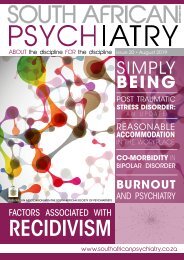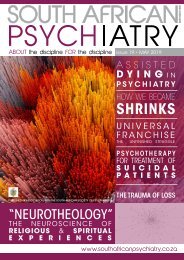South African Psychiatry - February 2019
South African Psychiatry - February 2019
South African Psychiatry - February 2019
You also want an ePaper? Increase the reach of your titles
YUMPU automatically turns print PDFs into web optimized ePapers that Google loves.
FEATURE<br />
DEADLY MEDICINE:<br />
PAYING THE PIPER<br />
- THE PERVERSE PROTOPSYCHOTIC<br />
NATURE OF LIFE ESIDIMENI THROUGH<br />
A CONTEMPORARY FREUDIAN LENS<br />
Coralie Trotter<br />
“<br />
Psychoanalysis begins in wonder that the<br />
unintelligibility of the events that surround<br />
one do not cause more wonder” writes<br />
Jonathan Lear (1998, p. 28). This paper is<br />
about such an event: the Life Esidimeni tragedy in<br />
<strong>South</strong> Africa.<br />
In October 2015 the Gauteng Health Department or,<br />
as retired Deputy Chief Justice Dikgang Moseneke<br />
(Moseneke, 2018) put it, ‘an admittedly delinquent<br />
provincial government’ embarked on an avoidable<br />
mass relocation of psychiatric patients. This<br />
Gauteng Mental Health Marathon Project (GMHMP),<br />
supposedly in line with <strong>South</strong> Africa’s policy of<br />
deinstitutionalisation, imploded into a bitter humaninduced<br />
trauma. Over one and a half thousand<br />
mental health care users were unlawfully, irrationally,<br />
and hurriedly dispatched from psychiatric institutions<br />
mostly without their identity documents, medical files<br />
and support systems and sometimes with changed<br />
names. The relocation process left human wreckage<br />
in its wake.<br />
THE GAUTENG HEALTH DEPARTMENT<br />
OR, THE DEPARTMENT, AS THE FAMILIES<br />
REFERRED TO IT, ALSO CALLED IT<br />
THE DECANTING. IRONICALLY AND<br />
TRAGICALLY, ONE MEANING OF THE<br />
WORD DECANTING IS TO TEMPORARILY<br />
TRANSFER PEOPLE FROM ONE PLACE<br />
TO ANOTHER. THIS PROVED TO BE<br />
PERVERSELY TRUE.<br />
One hundred and forty four<br />
patients died silently soon after the<br />
shambolic and reckless endeavour<br />
from dehydration, starvation,<br />
exposure, injury and medical<br />
neglect rendering their transfers<br />
truly temporary. Patients were<br />
moved from place to place: from<br />
one unlicensed non-governmental<br />
organisation (NGO) to another or<br />
Coralie Trotter<br />
to hospitals or to morgues forcing<br />
concerned family members to engage in a perverse<br />
process of ‘hide and seek’ in order to locate their<br />
loved ones while alive and then their actual bodies<br />
after death. The whereabouts of some mental health<br />
care users are still unknown and unidentified bodies<br />
remain in limbo - or ‘decanted’. The survivors have<br />
been, again ironically, returned to the original facility.<br />
The implication of this is sobering: The Department<br />
used a term to describe a range of temporary<br />
human transfers before the Marathon Project had<br />
even been set in motion.<br />
On 22 nd August 2017 I received an email from a public<br />
interest law firm, Section27, requesting assistance to<br />
assess the impact of the Life Esidimeni relocation on<br />
a group of, at that stage, fifty five families who had<br />
lost a family member due to the project. The aim<br />
was to produce a report that could be presented as<br />
evidence for an Alternative Dispute Resolution (ADR)<br />
or arbitration process under Justice Moseneke. This<br />
was done with the assistance of a team (LETEAM)<br />
of twenty registered mental health professionals<br />
with diverse clinical qualifications and a range<br />
SOUTH AFRICAN PSYCHIATRY ISSUE 18 <strong>2019</strong> * 17
















